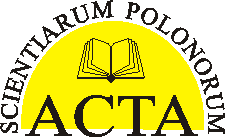Title
EFFICACY OF SPINOSAD AND Bacillus thuringiensis var. kurstaki IN BIOLOGICAL CONTROL OF THE EUROPEAN CORN BORER ON SWEET CORN
Autor
Paweł K. Bereś
Keywords
Zea mays var. saccharata, Ostrinia nubilalis, biopesticides, effectiveness
Abstract
The European corn borer (Ostrinia nubilalis Hbn.) is one of the most dangerous pests of sweet corn in Poland. As indicated in the guidelines for integrated pest management (IPM), harmful organisms on plants should at first be controlled by non-chemical methods and, if these are ineffective, the use of chemical methods is allowed. The aim of this study was to assess the effectiveness of biopesticides containing spinosad and Bacillus thuringiensis var. kurstaki to reduce the population and harmfulness of O. nubilalis caterpillars. The study was carried out in 2013–2015 in southeastern Poland, on ‘Candle’ sweet corn. Corn plants were sprayed either once or twice in July, when O. nubilalis larvae hatched on a mass scale. The pest was controlled with Spintor 240 SC (spinosad A + spinosad D) at doses of 0.2 and 0.4 l∙ha-1, Dipel WG (B. thuringiensis var. kurstaki) at doses of 1.0 and 2.0 kg∙ha-1, Karate Zeon 050 CS (lambda-cyhalothrin) at a dose of 0.2 l∙ha-1, and Proteus 110 OD (thiacloprid + deltamethrin) at a dose of 0.5 l∙ha-1. All products reduced the number and harmfulness of larvae, especially on cobs which are a commercial crop. The best effects were achieved after two treatments with biopesticides at higher doses. This reduced nearly by half the number of cobs damaged by the pest. Spinosad was more effective than B. thuringiensis. The effectiveness of biopesticides depended on weather conditions. Chemical pest control was found most effective.
Pages
19-35
Cite
Bereś, P. (2016). EFFICACY OF SPINOSAD AND Bacillus thuringiensis var. kurstaki IN BIOLOGICAL CONTROL OF THE EUROPEAN CORN BORER ON SWEET CORN. Acta Sci. Pol. Hortorum Cultus, 15(6), 19-35.
Full text


